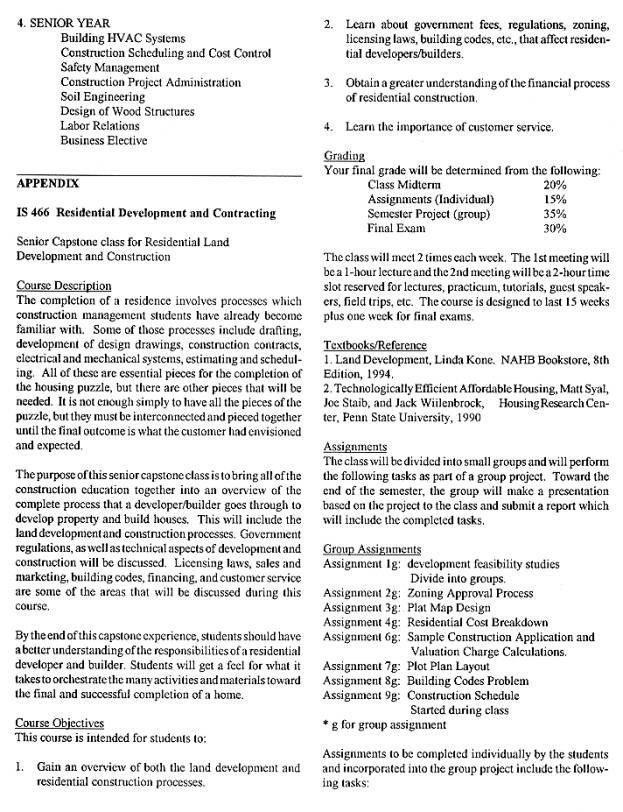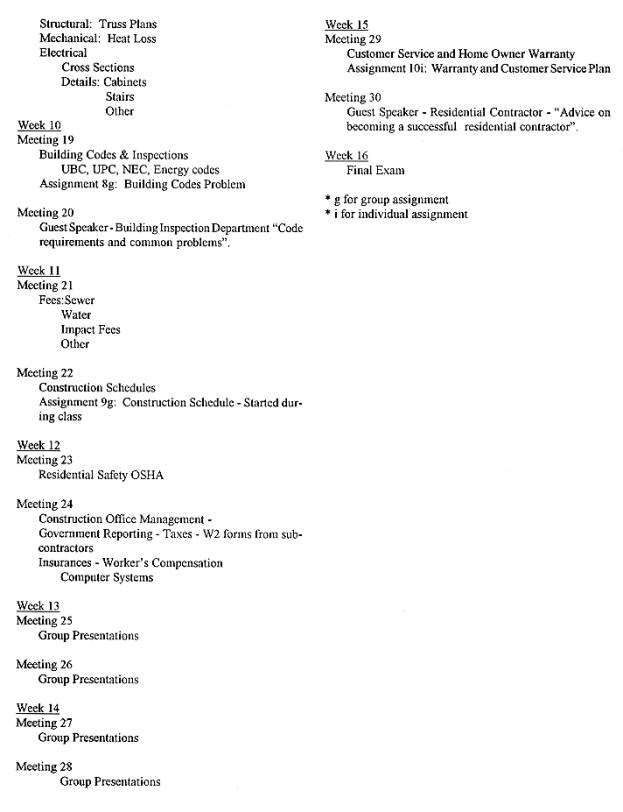|
(pressing HOME will start a new search)
|
|
Development of Specialization in Undergraduate Curriculum Through Senior Level Capstone Courses
|
Matt
Syal Building
Construction Management Michigan
State University |
|
|
Jay
Christofferson Construction
Management Brigham
Young University |
Gazan
Bozai Construction
Management Colorado
State University |
|
With
the increased diversification in the construction industry, there is a
great need to provide certain level of specialization training to
Construction Management graduates. Senior level "capstone"
courses related to different segments of the construction industry can
serve as an effective means of developing specialization. This paper
discusses the need and scope of such capstone courses and provides a
detailed description of a proposed course at Colorado State University
on "Residential Development and Contracting. Keywords:
CM Curriculum, Capstone
Course, Commercial Building Construction, Heavy-Highway Construction,
Residential Development and Construction |
Introduction
The
construction industry is the largest industry in the United States. It
constitutes about 10% of American gross national product [Oglesby 19891. Over
the years, the construction industry has become very diverse as the industry
members found business niches in various specialized aspects. Presently, one can
easily come up with a list of tens or hundreds of areas where a construction
professional can contribute. Despite the vast list of specializations, the
entire construction industry can be broadly divided into four major domains of
construction projects [Oglesby 1989]
|
Construction
Domain |
%
of Total Construction Expenditure |
|
Residential
Buildings |
30-35% |
|
Non-Residential
Buildings |
35-40% |
|
Highway
|
20-25% |
|
Industrial
|
5-10% |
As
more and more construction companies are turning towards Construction Management
(CM) graduates to assist in the management of office and field functions, the
number of students entering the CM programs are on the rise nationally. This has
led to increased competition and at the same time, increased sense of
selectiveness among the companies as well as the students. The CM students are
becoming more aware of the type of company they want to work for and the type of
career they would like to pursue. In an informal survey conducted by authors
among seniors in the CM program at Colorado State University, around 3/4 of the
students had a preference of seeking a job with either a residential or
commercial or heavy/highway construction company [IS-461 19931. The above-noted
factors clearly indicate a need to train the CM graduates in generic aspects of
construction management along with some sort of specialized exposure to one of
the major segments of the construction industry. The term "generic
aspects" refers to the areas related to the concepts and principles of CM
which can be applicable to all the segments of the construction industry.
Existing
Construction Management Programs
Most
of the CM programs stress generic aspects of construction management in their
curriculum. This is based on the notion of increasing the employability and
choices of their graduates. In addition to the generic aspects, many CM programs
tend to favor one industry segment or another in their curriculum or class
exercises. Irrespective of the industry segment inclination, the goals of most
Construction Management (CM) programs can be summarized as follows:
-
To provide the techniques and mechanics to effectively perform the various tasks related to an entry level CM career at the jobsite as well in the corporate office.
-
To create an understanding of the life cycle of a construction project, i.e. from conception to completion to disposal.
-
To provide the knowledge base and the confidence necessary to advance to the upper management levels.
Among
the programs with inclination towards a particular industry segment, many
smaller programs tend to concentrate on residential building construction and
many larger programs tend to favor commercial building construction. In
addition, there are few programs, which have concentration in heavy-highway
construction or industrial construction.
The
CM program at Colorado State University has traditionally been considered to be
a program inclined towards commercial building industry. Over the years, the
program has undergone changes and in its current form, it is an example of a
program, which stresses generic aspects of construction management without any
specific specialization option. The curriculum, as shown in Table 1, represents
a balanced menu of construction, architectural, engineering, and business
topics, which help prepare a CM, graduate for any employer in the construction
industry [CSU-CM 19941.
Need
For Specialization
As
noted above, a large number of students in the CM program at Colorado State
University indicated a preference for a specialization in their curriculum. The
need from the industry side was confirmed during the authors' interaction with
industry leaders from residential and heavy-highway construction industries this
past year. These opportunities resulted from Colorado State's efforts to solicit
funding support from residential and heavy-highway construction industries. One
of the authors personally met with the presidents of 8 large residential
builders and two homebuilders associations in Colorado. Another author had the
opportunity to interact with several heavy-highway construction industry leaders
through an industry-specific advisory group. In both cases, the industry leaders
indicated the need to provide some sort of specialization for their industries,
in addition to generic CM exposure.
Capstone Courses
A
"capstone" is defined as the finishing stone of a structure.
Similarly, a capstone course at the senior level serves the purpose of pulling
all the information together, which was gained during the earlier courses. In
case of undergraduate CM education, it can also serve the purpose of providing
the overall information in context of a particular segment of the construction
industry. Such a course would serve two main purposes of helping the graduating
students to understand the various aspects of the CM training in terms of a
particular construction domain of their liking, and it would also help to
familiarize them with additional terminology or "jargon" of that
particular domain.
It
is the opinion of the authors that based on the demand of the CM training among
the perspective students and changing attitudes of the construction industry,
there is a strong needs to provide certain level of specialization to graduating
CM students. The number and extent of specializations can depend upon the size
of the programs and the makeup of the local or regional construction industry.
Given the typical sequence of CM curriculums and the course requirements by the
universities and the accreditation bodies, an effective solution can be to
provide capstone courses at the senior level. The students should be encouraged
to choose one of these courses based upon their interest and career plan.
At
Colorado State University, it was decided to develop senior level capstone
courses for the following three major segments of the industry.
-
Commercial Building Construction This is the most common area of interest among CM students. At Colorado State University, most of the CM graduates find employment in this segment of the construction industry. Presently, the course entitled "Construction Project Administration" comes close to serving the function of a capstone course. This course focuses on pulling together the various concepts related to contracts, estimating, scheduling, and project controls with an inclination to commercial building construction. The plan was to modify this course and include more commercial building construction specific content.
-
Heavy-Highway Construction The heavy-highway construction industry has, for quite some time, stressed the need to provide familiarization with the unique aspects of their industry to the graduating students. Efforts are underway to develop a capstone course for this segment of the industry which will review the CM tools and techniques in heavy-highway construction context. At the same time, the proposed course will also provide information on a number of industry specific topics such as, performance based pavement specifications, statistical quality assurance and quality control, construction of asphalt and concrete pavements, etc.
-
Residential Development and Construction This area has been growing in popularity among CM students partly due to the boom in the housing industry in Colorado. A capstone course has been recently developed at Colorado State University and is currently going through the approval process in the university system. The detailed description of the course along with the proposed assignments and weekly layout is provided in the Appendix. The authors would welcome comments and suggestions from the readers.
Summary
and Projected Benefits
Senior
level capstone courses related to different segments of the construction
industry can serve as effective means of providing specialization in the
undergraduate CM curriculum. These courses can be fitted within the constraints
of the university general studies requirements and the accreditation guidelines.
Such courses can be used to present various CM concepts and principles in the
context of a particular segment of the construction industry. Moreover, these
courses can be used to present additional terminology or "jargon" of
the given industry segment. Such courses will definitely find popularity among
the CM students as well as the industry employers. Some of the advantages of the
capstone courses can be summarized as follows:
-
Provide an opportunity to students to identify a career path with a particular segment of the industry.
-
Provide assurance to all the segments of the industry that the CM programs are addressing their specific needs and preparing the graduates to better suit their needs without extensive in-house training.
-
Provide an avenue for the industry to have a proactive role in the program.
-
Provide an opportunity to incorporate specific case studies in the class material.
-
Increased internship and student club activities.
The
three proposed specialization areas and the detailed outline of one course is
intended to provide a general understanding and a starting point for the
discussion on this important stage in the evolution of CM programs. The authors
realize that these recommendations may not be applicable to certain CM programs
which either already specialize in one or two major segments, or are sponsored
by a particular industry organization. Moreover, with the growing
diversification in the construction industry, some programs will find it useful
to create even further specialization in their program. In any case, there is a
great need to
prepare
the CM graduates beyond the generic knowledge of CM concepts and principles.
Acknowledgement
The
authors would like to acknowledge the funding and other support provided by
Village Homes of Colorado, S. Robert August and Company, and Home Builders
Associations in Colorado.
References
[CSU-CM
1994] Construction Management Program Brochure and Course Plan (1994). Colorado
State University, Ft. Collins, CO.
[IS-461
1993] Class Survey on Career Plans, IS-461 (1992, 1993, & 1994). Colorado
State University, Ft. Collins, CO.
[Oglesby 1989] Oglesby, C. H., Parker, H., and Howell, G. (1989). Productivity Improvement in Construction, McGraw Hill Book Company, New York, N.Y.
|
CM
Curriculum at Colorado State University (Construction,
Architectural, Engineering, and Business Courses) 1.
FRESHMAN
YEAR Drafting
Fundamentals Construction
Graphics Construction
Materials and Techniques Principles of Micro or Macroeconomics 2.
SOPHOMORE
YEAR Construction
Surveying Construction
Equipment Architectural
and Construction Planning Statics
Business
Law 3.
JUNIOR
YEAR Construction
Contracts Commercial
Construction Procedures Building
Electrical and Plumbing Systems Construction
Estimating Mechanics
of Materials Properties
of Construction Materials Elementary
Structural Design Engineering
Economy Financial
Accounting Management
Fundamentals |
|
|
|
|
|
|


